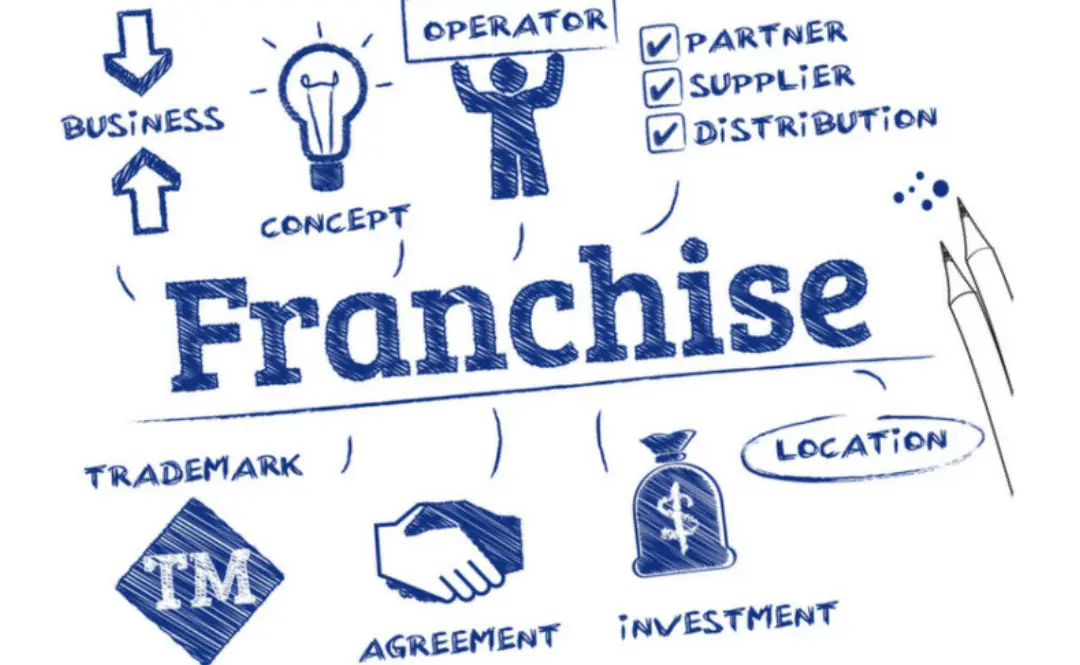7 Steps to Starting a Franchise Business: Your Business Plan
Starting a franchise business can be a gratifying venture for an aspiring entrepreneur. This comprehensive guide will walk you through the initial steps, ensuring you avoid common headaches and lay a strong foundation for your successful franchise.
Understanding the Franchise Business Model

Delving into the intricacies of the franchise business model is paramount for any prospective business owner. It’s about leveraging a proven business concept rather than embarking on a completely unknown startup, offering a distinct advantage. Understanding this model is the first step towards a successful franchise.
What is a Franchise?
A franchise is a license that allows an individual to operate a business using another company’s successful brand and business model. As a franchisee, you gain the right to sell a product or service under the franchisor’s established name. Thus, you benefit from their reputation and supply chain. It’s a structured path to becoming a business owner.
Types of Franchise Businesses
The landscape of franchise opportunities is vast and varied. Franchises range from fast-food restaurants to intricate service-based operations. Aspiring franchise owners can choose the right franchise that aligns with their skills and interests, whether it’s a retail outlet, a home-based service, or a large-scale commercial endeavor.
Benefits of Starting a Franchise
Starting a franchise business offers numerous benefits. One such benefit is the reduced risk associated with a new business. You inherit a customer base, a robust training program, and a ready-made business plan. The process avoids many of the typical logistics and staffing challenges associated with a true startup. This support enhances the likelihood of a successful franchise.
Choosing the Right Franchise
Choosing the right franchise is crucial for your entrepreneurial journey. This choice needs careful research and a clear understanding of your personal and financial goals. A good match with the franchisor can lead to a successful and profitable partnership.
Evaluating Different Franchise Opportunities
Thoroughly evaluating different franchise opportunities is a critical step for any potential business owner. This involves scrutinizing the market, assessing the product or service, and understanding the franchisor’s support system, ensuring you pick a franchise company that aligns with your long-term vision. It’s about finding the best fit for your entrepreneurial spirit.
Franchise Fees and Royalties: What to Expect
When considering purchasing a franchise, understanding the fees and royalties associated with it is essential. The initial investment covers the right to use the brand, while ongoing royalty payments, typically a percentage of your revenue, compensate the franchisor for continued support and brand use. A clear communication plan regarding these costs is crucial.
Importance of the Franchise Disclosure Document
The Franchise Disclosure Document (FDD) is a crucial tool in your quest to select the right business. This comprehensive document provides vital information about the franchisor, including their financial health, litigation history, and a detailed breakdown of all franchise fees. It’s your blueprint for due diligence, mitigating common headaches, and ensuring a well-informed decision for your new business.
Developing Your Business Plan
Developing a robust business plan is the bedrock of any successful franchise, serving as your strategic roadmap. It outlines your vision, strategies, and financial projections, providing a clear blueprint for your franchise business and impressing potential lenders or partners. This comprehensive document is crucial for guiding your initial investment and ensuring the long-term viability of your new business.
Key Components of a Franchise Business Plan
A comprehensive franchise business plan is far more than just a formality; it’s a living document that guides every aspect of your enterprise. It should detail your market analysis, operational strategies, and financial forecasts, serving as a beacon for your successful franchise. Neglecting any component can lead to common headaches down the line, so thoroughness is paramount for every prospective business owner.
Setting Realistic Goals and Milestones
Setting realistic goals and milestones is crucial for maintaining momentum and measuring the progress of your franchise business. These benchmarks provide a clear trajectory for growth, helping you celebrate small victories and make necessary adjustments as you progress. Without them, even the most promising franchise opportunities can drift, making it difficult to gauge the true success of your brand.
Financial Planning and Budgeting for Your Franchise
Proper financial planning and budgeting are the cornerstones of a successful franchise, ensuring that your initial investment is well-spent and your ongoing operations remain profitable. The process involves a clear communication plan for all expected expenditures. From franchise fees and royalties to operational costs and marketing, your budget must be tight. A well-crafted budget will help you avoid financial pitfalls and secure the future of your new business.
Preparing for Launch

The journey to launching your franchise business is an exciting yet intricate dance of preparation and strategic execution. This phase is where all your planning comes to fruition, transforming your theoretical business model into a tangible, operational entity. Proper preparation is the key to mitigating logistics, staffing, and communication challenges, setting the stage for a truly successful franchise.
Creating Effective Marketing Plans
Even with a proven business model, creating effective marketing plans is paramount for attracting your initial customer base and sustaining growth for your franchise. This isn’t just about shouting your product or service from the rooftops; it’s about strategically reaching your target audience and building brand recognition within your specific market. A well-executed marketing strategy can significantly boost your franchise’s success.
Staffing and Training Programs: Building Your Team
Building a strong team through smart hiring and good training is key to your franchise’s success. Your employees represent your brand; they are the ones who bring your product or service to life and show customers what you’re all about.
When you invest in solid training, you’ll get two major benefits:
- Consistent Quality: Your team will deliver the same great experience every time.
- Happy, Efficient Staff: Good training leads to fewer staffing problems and a better reputation for your new business.
Setting Up Operational Support Systems
Establishing robust operational support systems is crucial for the seamless operation of your franchise, providing a solid foundation for a truly successful franchise business. Operational support encompasses everything from supply chain management to customer service protocols. Having a reliable communication plan ensures smooth processes and consistent quality. A good system minimizes logistical headaches and allows the franchisee to focus on growth, rather than getting bogged down in minutiae.
One effective way to enhance your operational support is by utilizing a Voice over Internet Protocol (VoIP) cloud-based telephone system. This technology can often save thousands of dollars compared to traditional telephone systems, making it a wise choice for business owners seeking to optimize their startup costs. VoIP systems are flexible and feature-rich, providing a means to handle incoming calls and manage your precious time efficiently.
With a VoIP system, franchise owners can enjoy advanced features such as call forwarding, voicemail-to-email, and virtual receptionists. Properly using these features is essential to maintain a professional image and ensure that no call goes unanswered. Fine-tuning your customer service also contributes to the overall brand recognition of your franchise.
For aspiring entrepreneurs considering starting a franchise business, investing in a VoIP system can be part of the best practices for ensuring the franchise’s success. The long-term success and profitability of this technology outweigh the initial investment. Moreover, the ongoing support and training associated with these systems can further enhance the effectiveness of your marketing plans and operational efficiency.
Executing Your Franchise Strategy

Launching Your Franchise: Best Practices
Launching your franchise is the culmination of extensive planning and a testament to your entrepreneurial spirit. Adhering to the franchisor’s best practices during this pivotal phase is paramount, ensuring a smooth transition from concept to operational reality.
This planning stage has several essential steps. First, create a grand opening strategy to generate buzz. Next, focus on onboarding your initial customer base. Finally, address the key factors for a successful franchise. Proper planning helps you avoid common startup headaches.
Monitoring Performance and Making Adjustments
Once your franchise business is up and running, the real work begins. You need to continuously monitor your performance and be ready to make smart changes. This proactive approach helps your business stay flexible and adapt to market changes, which is crucial for success.
Regularly reviewing sales data, customer feedback, and how well your operations are running will help you identify areas that need improvement. This allows you to adjust your strategies as needed and keep a competitive edge as a savvy business owner.
Leveraging Support from the Franchisor
One of the distinct advantages of starting a franchise business is the inherent support system provided by the franchisor, a resource that savvy franchise owners leverage to their utmost benefit. This support includes ongoing training programs, marketing assistance, and operational guidance. The design of these programs is to bolster your new business and mitigate common challenges. Tapping into this wealth of experience is a strategic move, ensuring you never feel alone in your entrepreneurial journey and can always refer to their proven business methods.
Overcoming Common Challenges
Logistics: Managing Supply Chain and Inventory
Managing logistics can be challenging, especially for new businesses and growing franchises. Effective stock control and a strong supply chain are crucial. They help maintain product quality and meet customer demand, which is vital for your franchise’s success.
To ease these challenges, establish clear communication with suppliers. Implementing effective inventory management systems can ensure goods and services flow smoothly.
Addressing Staffing Issues
Staffing issues are a perennial concern for many entrepreneurs. A franchise business is no exception, and it demands strategic solutions to attract and retain top talent. From initial recruitment to ongoing professional development, a well-thought-out staffing and training program is essential for building a loyal and efficient team. By fostering a positive work environment and offering competitive compensation, you can mitigate common staffing headaches. Good staffing ensures highly motivated and capable individuals consistently represent your brand.
Creating a Reliable Communication Plan
In the complex ecosystem of a franchise, establishing a reliable communication plan is not merely an option but a strategic imperative for seamless operations and dispute resolution. This extends beyond internal team discussions to include transparent interactions with the franchisor, suppliers, and most importantly, your customer base. A clear and consistent communication framework helps address common headaches swiftly. Good communication fosters trust, aligning all stakeholders with the goals and values of your successful franchise business.
Building a Successful Franchise
Continuing Education and Support for Franchise Owners
Being a franchise owner means constantly learning and adapting. Continuing education and strong support are crucial for long-term success. Franchisors play an important role by offering training programs and sharing updated best practices. This helps franchisees stay competitive in their industry. Ongoing professional development allows franchise owners to improve their business models and handle new challenges with confidence. Ultimately, this strengthens their brand in a changing market.
Networking with Other Entrepreneurs
Being a franchise owner means constantly learning and adapting. Continuing education and strong support are crucial for long-term success. Franchisors play an important role by offering training programs and sharing updated best practices. This helps franchisees stay competitive in their industry. Ongoing professional development allows franchise owners to improve their business models and handle new challenges with confidence. Ultimately, this strengthens their brand in a changing market.
Evaluating Long-Term Growth Opportunities
A truly successful franchise business is not just about immediate profitability, but also about foresight and the strategic evaluation of long-term growth opportunities. As a discerning business owner, this involves constantly assessing market trends, potential new product or service offerings, and the possibility of expanding with additional franchise locations. Proactively exploring these avenues ensures that your initial investment continues to yield returns and that your franchise remains a dynamic and thriving entity for years to come.
Conclusion
In conclusion, starting a franchise business can be a rewarding venture for aspiring entrepreneurs. By focusing on key elements such as a solid business plan, choosing the right franchise, and understanding the franchise agreement, you can set the stage for a successful franchise. Implementing proven business practices, effective marketing strategies, and ensuring ongoing support and training for staff can significantly enhance the franchise’s success. Additionally, understanding the demographics of your local market and establishing a strong customer base will contribute to long-term profitability. If you’re ready to embark on this journey and need assistance in setting up your feature-rich cloud-based telephone service, contact Carolina Digital Phone at (336) 544-4000 for help.


